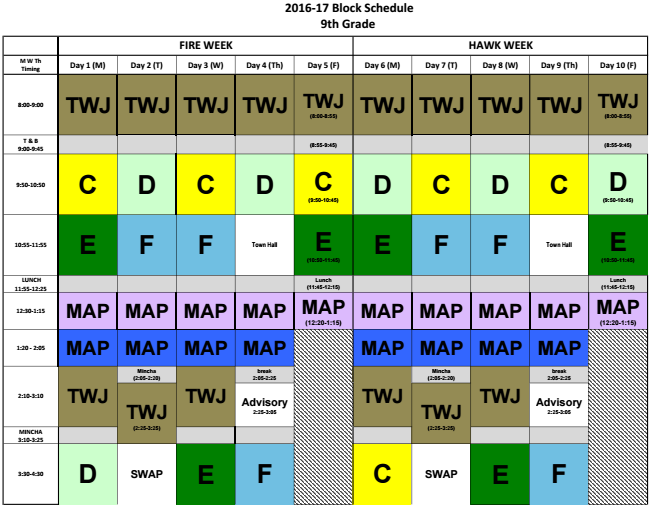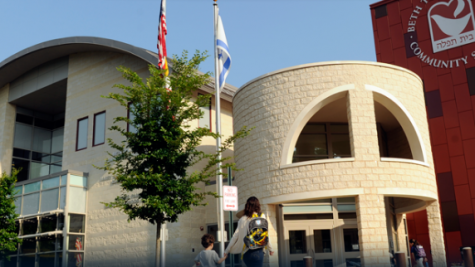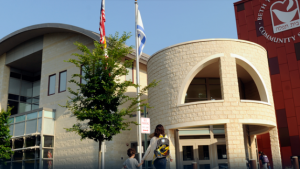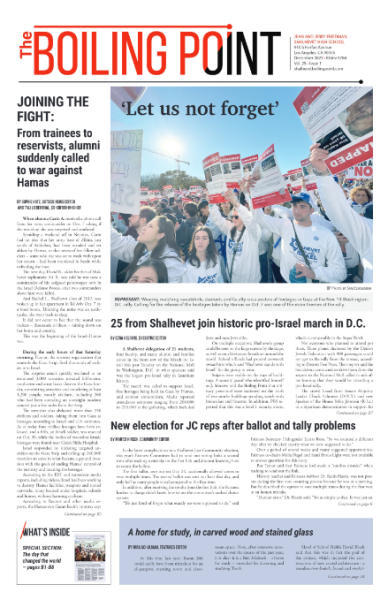Math more often, more Talmud and less lunch time among schedule changes for 2016-17
Different grades will have different schedules and school will get out at 4:30 instead of 4:20. Most changes affect freshmen and sophomores only.
SCHEDULE: Ninth-grade master schedule shows new “MAP” periods after lunch, which will be dedicated to math, arts and P.E. classes.
July 22, 2016
A longer school day, different lunch periods and schedules for different grades, more Talmud and math, and no SWAP for upperclassmen are some of the changes in a major overhaul of the schedule for the school year that starts Aug. 30.
While the most noticeable changes affect only the ninth and 10th grades, the plan lengthens the normal school day for everyone by 10 minutes to 4:30, and shortens it Fridays to 1:15. It also alters the lunch period, which on some days will be only 35 minutes for ninth- and 10th-graders, and 65 minutes for grades 11 and 12.
Principal Reb Noam Weissman announced the changes in an email sent to students and parents July 11. The previous block schedule, with 60-minute classes meeting approximately every other day, was introduced in 2012.
“When we adopted [the] modified block schedule, the purpose was to have longer classes that you could get more work done and have a more formal classroom experience,” said Reb Weissman. “But [since then], we got the sense that not all disciplines demand that same amount of time, nor the same amount of frequency.”
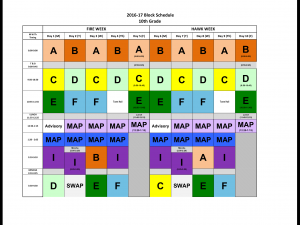
In the new school year, ninth- and 10th-graders will have two 45-minute periods in a row, called “MAP” periods, right after lunch. MAP stands for Math, Arts, and P.E. and the block was constructed specifically so that math could meet more often, Reb Weissman said. Underclass math courses will now meet four times per week instead of three.
“Math teachers frequently spoke about how they didn’t have enough contact in terms of meeting time and they needed the frequency of the meeting time,” said Reb Weissman. “When we spoke to a number of differently people, a number of different professors, a number of different schools, they also agreed that that was necessary for math classes.”
Since the two MAP periods total 90 minutes each day and are in place of one 60-minute class, the 9th and 10th grade lunch was shortened to 30 minutes, compared to last year’s 45 minute lunch period and the new 65-minute lunch for 11th and 12th graders.
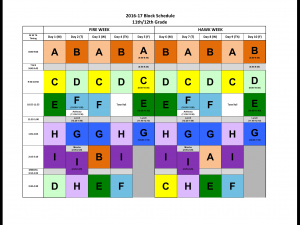
The new schedule also aligns, and somewhat merges, freshman World History and Jewish History classes, which used to meet three times per week each. Now they will each meet twice a week – meaning history will drop from six periods per week to four.
According to Reb Weissman, the two courses will now be “speaking to one another” to allow for a more comprehensive approach to history.
“When a kid is learning about Greek history, the fact that he is not making any connection or she is not making any connection to what is happening in the Jewish world, is a travesty frankly,” said Reb Weissman.
“There is one educational vision, that General Studies and Judaic Studies is supposed to synthesize and integrate and not be on two different shoulders and two different personaes,” Reb Weissman said in an interview. “It’s supposed to be making an impact on one another, ultimately creating a synthesis in how students and human beings internalize everything that they’re learning.”
General Studies Principal Mr. Daniel Weslow said staff was spending time over the summer to coordinate the two subjects’ curricula. New history teacher Dr. Keith Harris, new Jewish History teacher Mr. Jeremy Shine and Dean of Students Mr. Jason Feld are involved, he said.
“They’ve already started collaborating on it and it seems there is quite a bit of overlap…,” said Mr. Weslow. “It just kind of lends itself to this beautiful integration between those two classes.”
College counselor Ms. Aviva Walls, who designed the schedule, explained that the longer lunch for juniors and seniors was necessary because otherwise there would have been different bell schedules for underclassmen and upperclassmen.
Eleventh- and 12th-graders will have lunch from 11:55-1:00 on Monday, Wednesday and Thursday while lunch will be from 11:45-12:15 on Fridays due to the early dismissal. On Tuesdays lunch will be from 12:30-1:00 because advisory will take place from 11:55-12:30.
“It would have been a logistical mess and nightmare to have two different schedules at the same time,” said Ms. Walls.
Reb Weissman agreed, but said there were several other reasons also.
“It’s because they go off campus, and they often have more projects that they’re working on with one another and meeting with teachers in a serious way,” said Reb Weissman. “As our students get older there’s also more autonomy and independence, which comes with responsibility, and we’re more flexible.”
Moreover, said Reb Weissman, the longer lunch counterbalances the loss of SWAP – the school-wide appointment period – for those in 11th and 12th grade.
“[SWAP] wasn’t something that was used the way it was meant to be used,” said Reb Weissman. “What it turned into – and it was okay, but it wasn’t optimal in our opinion – it turned into an opportunity for juniors and seniors to leave campus and-or to socialize. Those are great things and they’re important and we have set times for those, [but] the purpose of SWAP was not for that.”
Mondays and Wednesdays will be particularly full for freshmen. Instead of a 50-minute lunch followed by two classes, Mincha and then a final class, this year’s freshmen will have their shortened lunch, two MAP periods, a full-length period, Mincha and then a fourth class period.
For sophomores, a similar schedule will apply on Wednesdays and Thursdays.
“Just not everyone all the time together during lunch, I think, is a chaval,” or bummer,” said Reb Weissman. “I just don’t think that there are workarounds to that.”
Ms. Walls said that shortened lunch for underclassmen was one of the difficulties with the new schedule.
“Having a totally unified lunch period for the whole school is a chance for students to interact more with different grades,” said Ms. Walls. “I think that’s something we’ll have to work at to make sure there’s still the same interaction between the classes.”
Freshmen will now have more class time for Talmud than any other subject. — Reb Noam Weissman, Principal
Along with the MAP periods, the new schedule brings a new period for freshman called “TWJ,” standing for Talmud, World History and Jewish History. TWJ will meet eight times per week.
Four of the classes will be Talmud; two will be Jewish history and two World History.
Combined with the other four hour-long periods belonging to Talmud, freshmen will now have more class time for Talmud than any other subject.
“No matter what level a student is currently at, it is a type of skill that is similar to math that requires a lot of practice and exercise,” said Reb Weissman.
Talmud teacher Rabbi David Stein agreed.
“Talmud study requires a lot of time and a lot of input,” said Rabbi Stein. “We really thought it was cool to have this opportunity and to expand on the learning, and I think it’s really going to impact the students…and what the students get out of the curriculum.”
Unlike years past, Advisory time will not be uniform throughout the school. Freshmen will have it on Thursdays following a short break after their second MAP, while 11th– and 12th-graders will have it on Tuesdays from 11:55-12:30, resulting in a shortened lunch that will end at 1.
Fridays will be different this year for everyone. Dismissal will be at 1:15 p.m. instead of 2 o’clock, and instead of last year’s five 50-minute classes and a 40-minute lunch, the new Friday will have four 55-minute classes and a 30-minute lunch, officials said.
“We started noticing that it was really hard for many, many of our teachers to finish their last class, wind themselves down and then get back to preparing for Shabbat,” said Reb Weissman. “This is not something new. Orthodox schools around the country end early.”
To help students who often miss their last class of the day due to co-curriculars, the new schedule ends each day with a different class, rather than ending school with the same class three times per week as in the past.
For underclassmen, four of the eight MAP periods each week will be for math, and the other four will alternate between P.E. and arts classes, Music Appreciation for 9th graders and Art Composition and Design for 10th graders. Under the old block schedule, PE, art and music classes only met three times each over the two week block schedule in two weeks, these classes will now meet four times, though for only 45 minutes at a time.
P.E. teacher Raelyn Bieda is glad the change was made because she will now see her students more frequently.
“Obviously I’m always going to be in support of more exercise,” said Mrs. Bieda. “A lot of the kids told me that I’m the only exercise they get during the week so it’s better that they have it more often.”
Music teacher Mrs. Joelle Keene was also delighted.
“I am so happy to be seeing each class twice a week,” said Mrs. Keene. “For the last few years, I often saw them once a week, or less. I couldn’t get to know the kids very well and I couldn’t get traction on the curriculum, the classes were so far apart. No one could remember what they’d learned or where we were. And if there was a holiday or special schedule I could go for two weeks or more without a class meeting.”
“This year is going to be completely different – I can’t wait,” she said
The 9th grade schedule that has been sent to students shows nine MAP periods per week total, but, according to Ms. Walls, one per week will be a free period.
However, 10th-graders will not receive this free period because during when 9th graders are having their MAP period on Monday after lunch, 10th graders will have Advisory.

